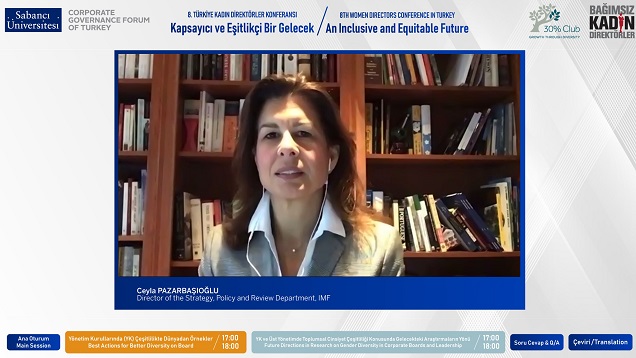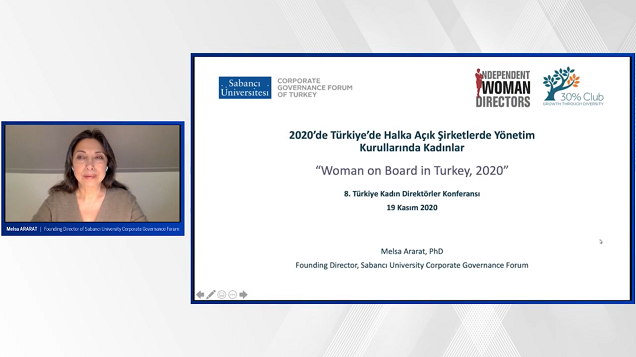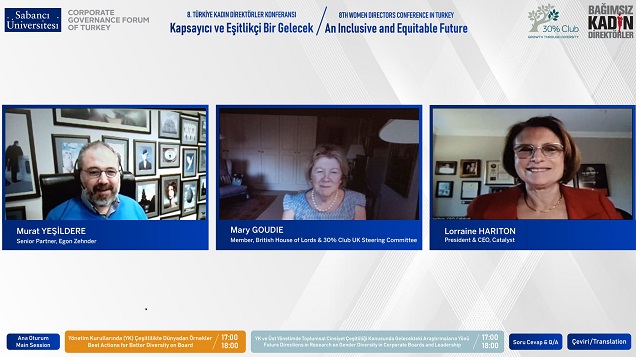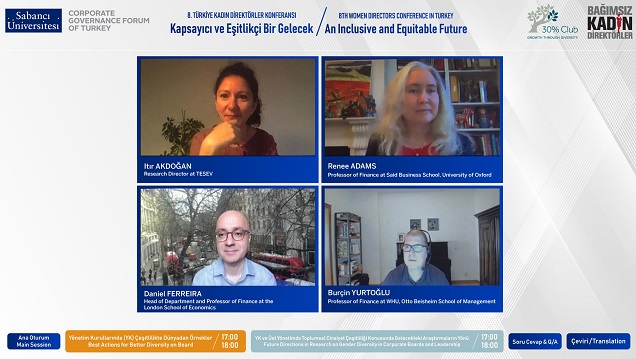16/12/2020
The 8th Women Directors in Turkey Conference organized by Sabancı University Corporate Governance Forum was held online this year on Thursday, November 19, 2020 with the support of Akbank, IFC, Limak Investment and Zorlu Holding. The conference under the theme of 'An Inclusive and Equitable Future' was held with the participation of experts in this field and shared the results of the 2020 Women on Board in Turkey Report.

According to the report results:
- In 2020, the proportion of women on BIST Boards increased from 15.9% to 17%, and the number of female directors increased by 5.3%.
- The rate of women among independent board members in BIST 100 companies, continuing its increase from 2019, increased from 17.7% to 20.2% in 2020.
- While only 37 BIST companies’ Boards of Directors were women, the ratio of female CEOs remained at 2.5%.
The 8th Women Directors in Turkey Conference, organized by Sabancı University Corporate Governance Forum, was held online this year on Thursday, November 19, 2020. Held with the support of Akbank, IFC, Limak Investments and Zorlu Holding, the theme of the conference this year was “An Inclusive and Equitable Future”.
The keynote speaker of the conference Head of the IMF Strategy, Policy and Review Department, Ceyla Pazarbaşıoğlu drew attention to the pandemic having increased the inequality between genders and said: “The global average female labor force participation in 2019 was about 20 percentage points lower than males. The Covid-19 crisis is likely to exacerbate gender inequality. For instance, women are more likely to work in face-to-face jobs that have been more acutely affected by social distancing measures. In the United States, about 54 percent of women working in social sectors cannot telework. In Brazil, it is 67 percent. In low-income countries, it is more than 88 percent who cannot telework. Women also bear the brunt of family care responsibilities. among parents with at least one child under the age of 6, men were roughly three times more likely to have returned to work than women. So far, only 41 percent of countries have introduced measures to protect women’s economic security in the face of the pandemic. But some countries have moved quickly. Austria, Italy, Portugal, and Slovenia have introduced a statutory right to (partially) paid leave for parents with children below a certain age, and France has expanded sick leave to parents impacted by school closures if no alternative care or work arrangements can be found. These policies are not only crucial to lift constraints on women’s economic empowerment, they are necessary to promote an inclusive post-COVID-19 recovery. While things may at times seem daunting, the pandemic also presents the greatest opportunity of our lifetime to usher in an inclusive and equitable future. "
Sabancı University Corporate Governance Forum Director Melsa Ararat said in her speech: “Participatory economic decision-making mechanisms ensure gender balance in decision-making bodies paves the way for decisions to be equitable, fair and inclusive. If policy makers in Turkey are not more determined about women’s representation both politically, and in government controlled or private companies, the gap between the European Union and other developed countries and Turkey will further increase. It is essential for companies, before they are caught in quotas that will force sudden changes, to set targets for the representation of women in decision-making mechanisms, develop policies and report on them, both for the future of companies and for the economy of the country.
The “2020 Women on Board in Turkey Report” was also shared at the conference.

The number of women in Boards of Directors continues to increase steadily.
According to the results of the “2020 Women on Board in Turkey Report”, in 2020, the proportion of women in BIST Board of Directors increased from 15.9% to 17%, and the number of women members increased by 5.3%. In BIST-100 companies, the ratio of women in the boards of directors increased from 13.7% in 2019 to 15.6%. In 2020, the rate of female board members in 30% Club companies reached 20%.
The major focus of the 30% Club campaign in increasing the female ratio among independent board members in Turkey BIST 100 companies reported an increase from 17.7% to 20.2%, positively continuing the upward trend in 2019. The report also shows that 116 companies have achieved the minimum rate of women members recommended by the Capital Market Board (CMB) of 25%, but this constitutes only 29% of all companies.
With 41 companies with at least 3 women members constituting only 10.3% of all companies, it can be observed that 356 companies have still not yet been able to achieve effective gender diversity in their decision-making mechanisms.
134 companies among all BIST companies, and 25 companies in the BIST-100, are still managed by all-male boards. Of all BIST companies, there are only 37 women chairpersons and only 14 female CEOs are on the boards of directors.
Slow but positive change in the number of boards with at least one female member
In 2020, the boards of 134 of the 397 companies consist of only men. This number corresponds to 33% of all companies. From 2012 to 2020, the ratio of companies with at least one female member on the boards of directors has slowly but positively changed, as in 2019, and the ratio of companies with all male boards in 2020 has decreased to 33.8%.
In 2020, an increase in the ratio of female members both among the total members of the board of directors and among the independent board members can be observed. The ratio of women among the independent board members, on the other hand, has exceeded the ratio of women in total and reached 18.5%.
In 2020, we see that 42% of 458 women are from families that are company controlling shareholders. The 265 women who have broken the glass ceiling and were elected to the board of directors constitute only 9.8% of the board memberships of BIST companies
Companies with the highest score have been announced

In the conference, two separate panels were held, and the awards of the Women Empowered Board” were conferred on their recipients. The companies with the highest 3 scores on the “Women Empowered Boards of Directors Index” developed by Sabancı University Corporate Governance Forum academicians, and which have at least 2 female professional board members in the BIST 100, are respectively: Aksa Akrilik Kimya (also a member of the 30% Club), Koç Holding and Tekfen Holding. The company that reached parity in the Board of Directors index and received the highest score in the Star Market index was Türk Prysmian Kablo ve Sistemleri.
Moderated by Murat Yeşildere, Senior Partner of Egon Zehnder, the panel titled "Examples from the World in Diversity on Boards" was held with the participation of the 30% Club Steering Committee and the UK House of Lords Member Mary Goudie and Catalyst President and CEO Lorraine Hariton.

Moderated by Turkish Economic Social Studies Foundation Research Director Itır Akdoğan, the panel titled “The Direction of Future Research on Gender Diversity in Boards of Directors and Senior Management” was attended by the Professor of Finance at WHU Otto Beisheim School of Management, Burçin Yurtoğlu, Head of the Department of Finance at London School of Economics and Professor Daniel Ferreira and Said Business School University of Oxford Finance Professor Renee Adams.




